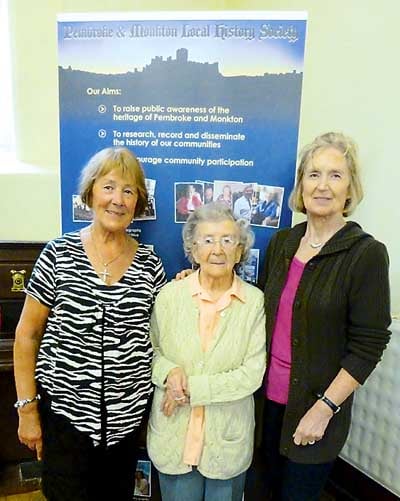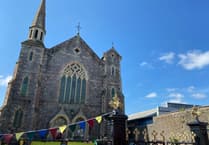Quiz Night
Congratulations to this month's winners of the quiz - Peter and Gaynor Thomas, Amanda and Bob Schopp who won again under fierce competition. For, despite the horrible, wet winter's night, no less than 51 people turned out to take part in our quiz night at Monkton Priory Church Hall last Friday. In no small measure I think due to the really good buffet and the friendly, social atmosphere!
The last local history coffee morning, held on January 7 in Pembroke Town Hall, had as its theme 'School Days Past' in the old Monkton and East End Schools. Fortunately many of you responded to our appeal for photographs and we are now building an archive of old school photos dating back to the late 19th Century. Many thanks to Michael James and Claire Perry for supplying this week's photographs.
Schools for Pembroke
The Victorians laid the foundations of our modern education system although the fight for a free universal elementary education was a long one, eventually achieved towards the end of the Queen's long reign. We take so much for granted nowadays - even in my grandmothers time, whilst receiving an elementary education, she had to leave school aged 11 and was apprenticed to a dressmaker. She did, however, in that short schooling achieve a high level of literacy - I remember well her beautiful handwriting!
An improving situation
If you were poor in the early part of the 19th century, you had little hope of an education. The best on offer was Sunday School and there were also Dame Schools which were little more than child minders. Your only reading book was the Bible with some arithmetic; very little else.
Moves to improve the situation were led by religious reformers, and in 1811, the National Society for Promoting the Education of the Poor in the Principle of the Established Church was formed. Its schools were called National Schools. In 1814, non-conformists formed the British and Foreign Schools Society.
Concern for the plight of children in factories eventually led to new legislation in 1833 to restrict the employment of children in factories. The two societies worked closely with factory reformers and advocated that young children should attend school at the very least on a part-time basis. The House of Commons awarded them a grant of £20,000 - the very first time government assistance was given to schools.
Pembroke 1847
In 1834, the Report on the Poor Law made it clear to parliamentarians that there was a duty on the government 'to promote the religious and moral education of the labouring classes.' In particular, it was felt that literacy needed to be extended so that working people had the power to understand their responsibilities as citizens. This was followed by a 'Report on the State of Education in Wales' in 1847 which makes interesting reading as it gives us an account of educational provision in Pembroke at that time.
"...The Rev. Mr. Davies, independent minister of Golden, near Pembroke, considered that in and about Pembroke there was a general carelessness on the subject of education, and that, as regards religious knowledge, the people were inferior to those in the Welsh districts. The Sunday schools are fewer, and worse attended. This inferiority would particularly apply to that part of Pembroke and its vicinity which lies in Monkton parish to the south and west..."
The Workhouse School
"I visited this school on December 16. The master had at one time been a soldier and his whole regime and phraseology were of a military character ...as soon as the Schoolmaster had been apprized of our object he tolled a great bell, and, when the summons had been answered by the appearance of a boy or two in the yard, called out lustily, 'Come, turn out there - fall in.' This was very readily done, 'To the right - face - march.' Each boy in passing gave a military salute. One of the file had neither shoe nor stocking, scarcely any of them had stockings. There was deep snow on the ground thawing at the time.
Education was based on reading the Bible with some arithmetic, while the matron instructed the girls in sewing. The inspector stated that he 'was very much pleased with the school.'
The report looked at the various schools in Pembroke - schools se-up in the master's or in some cases mistresses' houses, a National School in financial straights, a church Sunday School held in the National Schoolroom and a Wesleyan Sunday School.
Things were worse in the Parish of Monkton 'Labourers have not the means to get drunk, otherwise some of them would. They suffer severely from the failure of the potato crop this year ... Most of the farmers are able to read and write. Still many children and labourers are without education.'
Progress
Progress was made in 1861 with the building of the National School in Main Street in 1861 by the National Society for Promoting the Education of the Poor in the Principle of the established Church. Its schools were called National Schools. This school building can still be seen and it now houses the Antiques Emporium.
The now demolished Monkton Mixed Junior School was opened in 1866. It was built by the British and Foreign Schools Society, a non-conformist organisation, and was originally called the Pembroke British School.
The 1870, Education Act made the state responsible for education and laid down that schools should be provided for all children. The country was divided into school districts and in those areas where there was inadequate provision School Boards were to be elected. These were responsible for raising funds to maintain the schools
East End School was built following the 1870 Education Act and was a 'Board School.' It opened in 1873. These elementary schools were non-denominational and could charge a weekly fee not exceeding nine pence. In 1880, it was made compulsory for five-10-year-olds. School was not free until the 1891 Education Act.
The last of our Victorian Schools was Monkton Infants' School opened in 1889. Happily, this has not been demolished like the Monkton Mixed Junior School, but now housing a dedicated centre to travellers, it is known as the 'Monkton Priory School Project.'
Please, if you have any photographs or memorabilia which will add to the display in the museum, please call by or email them to me.
Contact
If you have any stories, photographs or feedback for this column, please contact me, Linda Asman, on 01646 622428, email [email protected]">[email protected] and visit our website http://www.pembrokeandmonkonhistory.org.uk">www.pembrokeandmonkonhistory.org.uk
Next event
Saturday, February 7, at Pembroke Town Hall, 10 am - 12.30 pm. We will be joined by WWMHS for a nostalgic look at those coastal trading days in Pembroke 'Remembering Kathleen and May.' This will be accompanied by a coffee morning.





Comments
This article has no comments yet. Be the first to leave a comment.